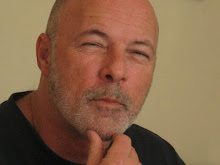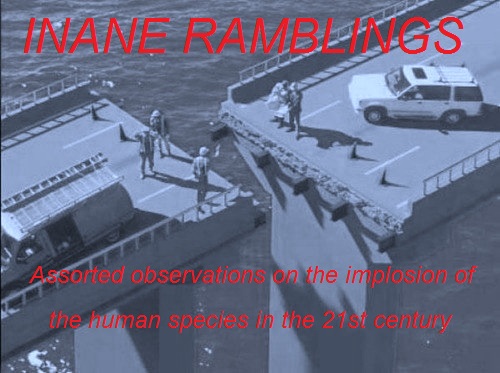As a child I ran across a Twilight Zone comic book. Among the stories was the tale of a man who was informed by a fortune teller that he would die on a certain date - we’ll say it was August 15th. Obviously traumatized, he wracked his brain to figure out a way to escape his destiny. Finally it hit him - he would charter a small aircraft, have it fly to the International Date Line, and fly right on the line (where it would be the 14th on one side, and the 16th on the other) for 24 hours, thereby cheating fate. As the journey neared it’s end, the man heard a thump from the front of the plane and went to investigate. The sound he heard was that of the plane being re-fueled, but in moving from the center of the plane he “crossed the line” onto the fateful day. You can guess how the story ends.
Technical inaccuracies aside (the International Date Line separates two calendar dates, not three), it was my first lesson in fatalism. Defined as a doctrine that all events are predetermined, that we really have no control over our destinies, I’d guess that most people don’t really believe in it. Or, say they don’t.
In observing those around us, however, you’d think some of us embrace the doctrine whole-heartedly. Take Nadine, for example. Her father left when she was a young child, and her Mother sank into a deep, alcohol-fueled depression. Nadine was left to envision a world where families stay together and love and harmony abounds, and vowed she would one day live in such a world. Fast-forward twenty years. Nadine, married at 19, sees her world slipping over the precipice, into the void of her youth. With a young child of her own, her marriage is crumbling and the future looks bleak. In spite of all efforts to the contrary, her fate is about to come full circle to that place she thought she’d left forever.
Or consider the case of Van, an over-achiever and honor roll student who became a VP at a prestigious marketing firm. With a very comfortable life, replete with family and friends and scads of money in the bank, Van was miserable. Throughout high school and college, his plan was to work his behind off until he could afford to retire, then spend his days surfing and his evenings hanging out at beachside calypso bars. But again, fate intervened. Van found that there was always another goal to attain, another check to write, another rung of the ladder to climb. Alas, Van has come to the sobering conclusion that he’ll never escape the prison he himself built, and resigns himself to his fate.
Could it be that fate is like a black hole, constantly drawing us in, but at an imperceptibly slow rate? A gravitational force perpetually pulling us away from our goals and dreams? Are we all just swimming against the current of some invisible energy form - some immutable karma?
Or, do we subconsciously sabotage our own best laid plans? Did Nadine see something in the darkness of her youth that was strangely inviting, even comforting? Did Van feel guilty, deeply ashamed for wanting what some would view as a frivolous, irresponsible existence? Are we all destined to fall prey to some strangely twisted, unspoken, self-fulfilling prophecy?
Like the airplane in the story, many of us crash and burn when we seem to hold so much promise. Those left to mourn us stand off to the side, wringing their hands, wondering what went wrong as we sleepwalk through our lives, numb with misery, and eventually self-destruct.
“It’s fate”, we say, as we resume our swim against that current.
skip to main |
skip to sidebar

About Me

- Rusty Wood
- Rusty Wood is a pseudonym, which I think is French for "fake name". Although most of my writing is (intended to be) humorous, I will wax philosophical from time to time. In any event, I hope you enjoy my work - whoever I am.
Total Pageviews
What Others Are Reading:
-
Marietta, GA – Thirty-three year old divorced father of two Matt Poole insured that everyone in attendance at his friend Rodney Spence’...
-
Well, it appears the truce in the Battle of the Sexes is holding and everyone is trying to get along and be sensitive to each other’s needs ...
-
I know, right? This simple three word oxymoron is both a declarative statement AND a question rolled into one stupid little quip. ...
-
Every good writer knows you never begin an article with stats. So, here we go: An estimated 22 million Americans and millions of others ...
-
Tis the season. For decking of halls and merry gentlemen resting, and riding horse-drawn sleighs over the river and through the woods to...
Labels
1984
2008
2010
advice
alienation
Angry Birds
authoritarianism
bad drivers
Battle of the Sexes
big brother
big pharma
binge-buying
blog for rent
boredom
Bret Michaels
cats
celebrity worship
Christmas
Christmas shopping
circle of life
cliché
collective soul
commercialism
Compassion
consumerism
corporate-speak
country music
covid-19
cyber-verse
de-evolution
Deceit
depression
disco
dog days
dog-and-pony show
driving while stupid
dry humor
Duct Tape
dysfunction
entrepreneurism
erectile dysfunction
escapism
etiquette
excuses
Facebook
Fatalism
fear tactics
Fifty Shades of Grey
football
forever lazy
fun on the cheap
getting older
Greatest Inventions
green products
Halloween
High School Musical
high-rise buildings
Hillary Clinton
holiday survival guide
home of the future
Horror Movie
humor
Infomercial
internet marketing
Jennifer Love Hewitt
jobs
Kim Jong-il
Kurt Vonnegut
Lindsay Lohan
Listening
marijuana
Matrix Reloaded
meaningless phrases
metaphorical garden
middle class
Milkgate
Mister President Contest
Mitt Romney
Monopoly Money
movies
new channels
New Year’s resolutions
New York Giants
NFL
Nietzsche
Octoberfest
Oh-Oh decade
Oprah
parenthood
peace
People’s Republic of China
perception
phrases that spell trouble
ping-pong diplomacy
planting a seed
platitudes
politics
President Obama
presidential election
reality tv
Rearranging the Deck Chairs
relationships
retrospective
Santa Claus
satire
self-fulfilling prophecy
senility
Sheep to the Slaughter
shirking responsibility
side effects
six degrees of separation
social networking
society
spam
sports
Star Wars
stupid quiz
summer
summer replacement shows
Super Bowl
technology
tenacity
the internet
Things Men Won’t Say
things that bug me
Things That Still Work
Tiger Woods
TMZ
trade imbalance
turning a page
tv
Twilight Zone
vampire-themed movies
Velcro
virtual reality
Volunteerism
wardrobe malfunction
Washington Redskins
ways to beat the heat
ways to drive your man wild in bed
Wii
working-class
workplace
world population
writing



